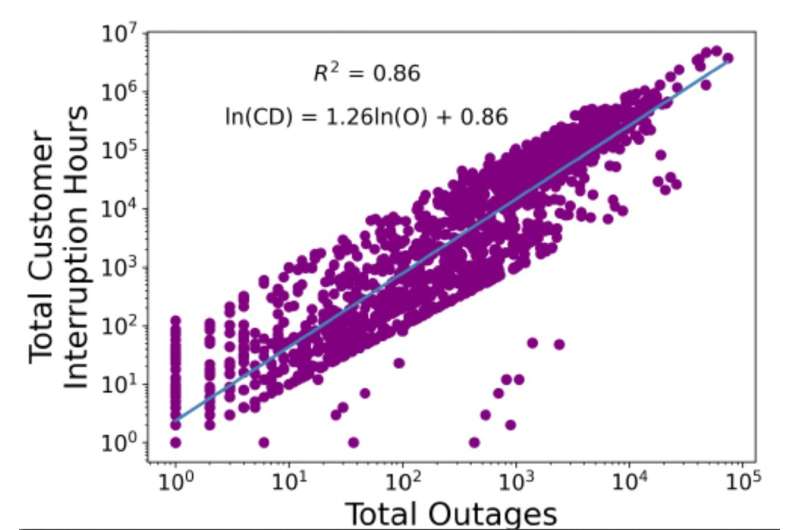This article has been reviewed according to Science X's editorial process and policies. Editors have highlighted the following attributes while ensuring the content's credibility:
fact-checked
trusted source
proofread
Researchers develop hurricane power outage prediction model that outperforms traditional methods

Utility companies are generally well-equipped to handle routine blackouts, but often struggle with extreme weather events like hurricanes.
Conventional hurricane power-outage prediction models often produce incomplete or incorrect results, hampering companies' abilities to prepare to restore power as quickly as possible, especially in cities that are susceptible to prolonged hurricane-induced power outages.
New research from NYU Tandon School of Engineering may help solve that problem.
By combining wind speed and precipitation data with data about an area's land use patterns—which reflect variations in power infrastructure between rural and urban areas—and population density—as an indicator of the number of transformers present—researchers are moving towards a more accurate physics-driven hurricane-induced power outage predictive model than techniques currently in widespread use.
Luis Ceferino, a civil and urban engineering (CUE) assistant professor and Prateek Arora, a CUE Ph.D. candidate, presented the research at the 14th International Conference on Applications of Statistics and Probability in Civil Engineering (ICASP 14), held from July 9–13, 2023 in Dublin, Ireland.
In May 2023, Natural Hazards and Earth System Sciences published the duo's paper evaluating the limits of existing power-outage prediction models. The paper discussed those models' restricted applicability due to reliance on data from specific regions and utility companies; unbounded predictions; difficulties in extrapolating to high wind conditions; and inadequate handling of uncertainties and variance in outage data during extreme weather events.
Compensating for those constraints, the research team is training its model with historical outage data from Hurricanes Harvey (2017), Michael (2018), and Isaias (2020). The model accounts for the nonlinear relationships between input parameters—meaning changes in one variable that do not result in proportional or consistent changes in another variable—and the likelihood of power outages.
In its ICASP 14 paper, the team focused on two key performance indices: the System Average Interruption Frequency Index (SAIFI) and the System Average Interruption Duration Index (SAIDI). SAIFI measures how often customers experience power outages and SAIDI reflects the total time customers spend without power in a year. These indices are pivotal in determining the efficiency and resilience of power systems during extreme weather events.
The research team used probabilistic modeling to compute/obtain the SAIFI and SAIDI for a 10-year return period in New Jersey. It revealed that rural areas face greater likelihood of outages than urban areas, when wind speed is the only damaging factor. The team is continuing to build the model, and upcoming research will incorporate storm surge effects, especially relevant for coastal blackout predictions.
By mapping out the potential scenarios and probabilities of power disruptions, this research project can equip stakeholders including utility companies and regulatory bodies with insights for strategic decision-making. This could include targeted resource allocation, infrastructure upgrades, and even the development of emergency response plans that mitigate the adverse impact of hurricanes on power systems.
More information: Paper: www.researchgate.net/publicati … tems_from_hurricanes
Provided by NYU Tandon School of Engineering




















